A country road, a tree, the Anthropocene
I’ve never seen a tree before. It’s pretty!
It’s dead…
Blade Runner 2049
Death is a complicated business and how one might feel about a particular death has a lot to do with how understandable it was, how inevitable. The loss of a loved one, near and dear, opens up a hole and the memories that flood in to fill it, though they might bring comfort, never completely make up for the extinguishment, the permanent elimination of an actual physical being from our lives. It is the finality of death that makes it so daunting. Most of us realize this (of course!) but we wish it weren’t true. We mitigate our grief by imagining our dear departed being ‘in a better place’ or ‘resting in peace’ or otherwise liberated from mortal suffering as if after death some remnant of the self might still remain that is able to experience relief. Who knows? Maybe dead is just dead?
Within the span of a year, I lost both my parents. ‘Lost’ is a strange way to put it – I know where they are – their cremains scattered under some bushes against the red brick wall of an old church beside a highway in suburban Toronto. The ground there shakes every time a big truck rolls by, which is pretty often due to the heavy traffic. Mom and Dad chose this spot many years ago when their deaths still seemed like a far-off possibility. Though they were both in their eighties by the time they passed on, (an average lifespan in Canada which still retains the tattered remnants of a public healthcare system, the way they each died came as a surprise. I don’t know what I was expecting really. Perhaps I had just put the inevitability of them dying out of my mind until the medical emergencies started to pile on, one after the other and their mortality became impossible to ignore. Yet the end of life is an issue we all have to face, sooner or later, ready or not.
As to why my parents wanted to be interred next to that particular church–it was because they’d developed a deep affinity for both the building and the community that congregated in it. That it was a Presbyterian church and they had always identified as German Lutherans didn’t seem to be a problem for them. At the top of a hill overlooking a sweeping river valley, the little church serves as a landmark in the neighbourhood where they had established deep roots. Before his mind started unravelling, Dad spent years as a church elder, overseeing the renovation of the steeple and visiting the sick. The memory garden where I scattered his and Mom’s ashes was installed by my brother, his first major commission after landscaping school. Our family home was just down the road in an old red brick house of similar vintage to the church, since we moved there in 1969. My parents lived there until it seemed prudent for them to downsize to a nearby apartment when Dad started his long decline.
Mom and Dad arrived in Canada in the late 1950s as impecunious immigrants from a war-ravaged Germany and I was born shortly thereafter. At that time, Dad did night shifts in a styrene factory as well as serving as the superintendent for the walkup apartment building where we lived. Mom toile away as a supermarket cashier. With the hard work and determination of the immigrant working class, Mom and Dad eventually rode the surging tide of Canada’s postwar economy from their blue-collar beginnings into the ranks of the lower middle class. The high point was when Dad got promoted from the factory floor to salesman, a job that came with a company car. When that happened, Mom celebratoriously ditched her unionized cashier job for a less remunerative one as a bank teller which she thought conveyed a higher social status because she could ‘wear nice clothes’ and not be spending her days stuffing bleeding chickens into paper bags at the cash register. Mom and Dad weren’t the bourgeoisie exactly but they genuinely felt they had made it in this new land of opportunity. We children came along in tidy five-year intervals, first me, just squeezing into the tail of the 1950s, my sister following in 1964, and my brother in ’69. Dutiful and committed, my parents continued to build their immigrant dream, rarely complaining through life’s many trials and reminding us children on regular occasions life was ‘so much better now than it was during the war,’ which of course it must have been – not that we were in any position to judge. They maintained decades-long friendships, mostly within the German diaspora and gave their time generously to various community causes. After all those years of living, loving and helping others, their lives simply ran out, one after the other, within the span of just over a year. We who were bereaved are left with our memories of course, but in the end, all that was left of Mom and Dad was sticky grey ash, not even enough to fill the small wooden box which I carried out to the churchyard to sprinkle onto the shrubs.
So how did it all go down, their deaths? And did they make any sense?
On the face of it, the way each of my parents’ lives ended did make some basic sense though it would be nice if they had been able to live a bit longer. Their lives each spooled out as all of ours will–my mother’s abruptly, and my father’s more slowly. The details will vary of course, but the end is assured. The luckiest of us might get to die peacefully in our beds deep in old age but for the rest, our demise might just as easily be precipitous. Life expectancy in OECD countries like Canada is currently averaging at 80.3 years. In the US, where I now live, the expected life span is actually dropping but still averages out at 78.7. Mom and Dad both made it past the eighty-year mark and thus died within an unremarkable window of longevity.
Before his Alzheimer’s, Dad had struggled with two major bouts of cancer, a legacy of his time working with toxic chemicals – first in a styrene plant, around the time that I was born, then subsequently in a factory producing Fiberglass fronted concrete blocks, conceived to speed up the construction of fast-food restaurants that were popping up like mushrooms all over Toronto’s rapidly-developing bedroom communities like the one in which we lived. My earliest memories of Dad are his smell. I remember the odour of burnt styrofoam emanating from the pores of his skin when he brought his face close to mine after returning home from the plant. The car upholstery smelled the same way, having absorbed his plastic-scented perspiration. It was just the way Dad smelled and the presence of his personal polystyrene cloud served to comfort me and made me feel safe.
Mercifully his cancer didn’t kick until he was nearing retirement, albeit a retirement that was involuntary, due to a corporate merger that subsumed the company he had given so much of his life to, from his years in the plant to his ascendance to the sales force. Neoliberalism had hit its stride after NAFTA was signed and the good jobs in Southern Ontario’s manufacturing heartland began predictably evaporating as companies took advantage of the opportunities to shift production to countries where labour was cheap. All over the region, legions of loyal workers were cut adrift. For many like my father, the immigrant dream was beginning to unravel.
I can’t help thinking that the psychological stresses of this precarious time strained his health, but at least Dad saw see his children grow up before getting hit by the big ‘C’. When cancer came, he took it surprisingly in stride. The first round was a near-fatal non-Hodgkin’s lymphoma, cancer that typically affects workers exposed to the type of chemicals that are used in plastic manufacturing. Intense chemotherapy was needed to bring it under control and even then, it was a long time before his remission could be assured. The irony that it took exposure to toxic chemicals to cause cancer and more toxic chemicals to take it away was not lost on Dad. By the time he was in remission, Dad was wrung out and never again regained his once-prodigious vitality. His personality changed too and he became much more reflective and less prone to the piques of anger he had been predisposed to. To those who loved him, it was a change for the better and I was moved to hear him talk about the long hours he spent volunteering at the cancer ward where he himself had been treated, reassuring anxious new patients splayed out on the leatherette recliners with chemo transfusions coursing through their blood vessels. I have no doubt his quirky humor and general bonhomie kept more than a few cancer patients from sinking deeper into their despair and I got the sense he was suddenly determined to give something back to the world after himself being granted a new chance at life.
But it wasn’t long before another cancer swooped down on him like a malevolent front – bowel cancer this time. The good news was it had been detected early and his doctors were guardedly optimistic he might recover. The surgery went without complications but disaster struck during what was supposed to be the postop. Dad was nearly killed when the hospital staff ill-advisedly rushed him into eating solid food. Not wanting to disappoint but nauseous and still in pain, Dad choked and inhaled his own vomit, the violent coughing that ensued bursting the sutures in his intestines. Emergency surgery followed but he was now also struck with aspiration pneumonia triggered by the food sucked into his lungs. He went from a cheerful convalescence to death’s door in the matter of a day and was unconscious in the ER amid beeping machines. Called to his bedside, I expected the worst. Flying in from British Columbia, I made sure to pack a dark suit to wear at his funeral, which everyone agreed was imminent. Amazingly, by the time I had arrived, the tide had turned and his doctors were allowing he might make a slow and somewhat complicated recovery. Mom, ever the tireless caregiver, nursed him through the multi-month convalescence that followed
Dad slowly recovered but his weakness was intractable and he seemed mentally dissociated. Though things at first seemed hopeful, in a cruel twist of fate, his cognitive state started showing signs of worrying impairment. At first, it seemed like post-surgery depression but then it became clear something more serious was wrong. The initial bouts of confusion he suffered after moving into the new apartment progressed into bouts of catatonia and continued exhaustion that worsened by the month. Dad lost his ability to speak, outside of a few unintelligible mutterings and refused to be roused from his bed. Mom was angry at him, accusing him of ‘just not making an effort’ but he continued to stare blankly into space. Alzheimer’s was confirmed and Mom’s toil now became never-ending. She had to cajole him into eating, and if he did put food into his mouth, make sure he remembered to chew. A cautious driver, she ferried him to countless medical appointments throughout the vast suburbs and as he was now incontinent, launder endless loads of his soiled undergarments and bedding. It wasn’t long before Mom slipped into a serious depression and she confided in me during her telephone calls to me in New York, where I was now living, that she was losing hope. Mom’s Sisyphean labours ended only when Dad happened to fall out of his bed one day, breaking his hip. As he recovered in hospital, the medical team finally realized the severity of his mental impairment and fast-tracked him into a dementia care facility. It had been obvious to all of us that my increasingly frail mother could no longer cope, and sad but relieved, she began to realize that with Dad taken care of, she could begin to focus on her own health issues.
Yet paradoxically Mom died before Dad did. It was sepsis that killed her after routine hip surgery; surgery I’d been hectoring her to have now that she had the time to begin looking after herself. Mom had been suffering from hip pain for years, affecting her sleep and forcing her to rely on a cane, which she hated. Her GP told her she was an ideal candidate as she was relatively fit for her age.
‘Go get your hip fixed..’ I implored her. ‘It’ll improve your life and you can ditch that cane.’
I soon came to regret those words and my naive faith in the infallibility of modern medicine.
Mom’s was a painful passing. She’d been recovering well after surgery and my brother had prudently booked her in for a temporary stay at a care home so she could recuperate with regular meals and monitoring. After Dad had been institutionalized, Mom was increasingly forgetful when it came to taking care of herself. When the time came for her my brother to take her home, she seemed lethargic yet still eager to leave. She was having trouble dressing and on the way down to the car, she collapsed in the elevator. By the time she was in the hospital emergency room, it seemed at first as if it was nothing more than a touch of the flu but soon her condition became much more serious. Mom’s vital signs were in freefall and the doctors scrambled to identify a virulent infection raging through her body. Her tissues started to swell and she became wracked in unimaginable pain. Mom soon lost consciousness and was dead within a couple of days. I sat vigil by her bedside as the voracious bacillus ate its way through her organs, while outside the window of the newly-built suburban hospital, sprawling over the featureless vastness of what used to be farmers’ fields, the gold and vermilion foliage of an Ontario autumn scintillated under the gas flame blue sky. Mom drew her last breath and I flew back to NYC to return to my work and await her upcoming funeral. A couple of weeks later I was back, standing in the churchyard, clutching a small wooden box that contained all that was left of her –a pile of grey ashes and some flecks of white bone.
As the first-born, the pastor instructed me I was to be the first to scatter her ashes. It was, to be honest, a little awkward, as there was a stiff breeze blowing in from the highway that caught them up, swirling them around me as I struggled to dispense the box with at least a modicum of dignity. My jacket sleeve, wrist and hand were soon covered in a clingy grey film of Mom’s mortal remains as the line of mourners formed to shake my hand. My melancholy flipped quickly into anxiety as it seemed crass to concern myself with tidiness at such a solemn time, to be wiping Mom off –the last vestiges of my mother’s corporeal existence– onto a scrunched up wad of toilet paper I had been kneading in the pocket of my jacket, while everyone else was watching, scrutinizing even, my performance with such focussed kindness and compassion. There was really no recourse, so for the sake of decorum, I turned away for a second and wiped my hand, just my sister was taking her turn doling out the cremains, my brother standing by her with the tears welling up in his eyes. It was all over in a few minutes, the last traces of Mom melding in with the topsoil and mulch (well more or less anyway–there were a few alarmingly un-melded spots I was hoping the groundskeeper would see to– the highway traffic unabated in its thrumming and the assembled party filing into an adjacent reception room for a buffet of coffee and sandwiches and a spread of homemade baked goods that would have truly lifted Mom’s carbohydrate-admiring heart, had she been present on this earthly plane to partake of it. Dad, mute in his dementia, sat transfixed in his wheelchair. He hadn’t uttered a word for the past several months and Mom had been taking it quite personally, despite the unambiguousness of his diagnosis, still stuck on the idea that somehow he was shutting her out when she made such an effort to visit him on his ward. During the service, Dad seemed to show some slight flicker of recognition when confronted with familiar faces from his congregation and he gazed searchingly into the eyes of those greeting him, though there was no indication he comprehended the tragic reason for this occasion. Perhaps it was better that way. Dad had been a mercurially emotional man. Though his relationship with Mom had been complicated in terms of its power dynamic, losing her after over 65 years of marriage might well have unmoored him beyond recovery had he still been in his right mind. But he wasn’t in his right mind, and that was that, and though my siblings and I hoped he might still have some sense of how much we all loved him, what remained of his subjectivity was now completely opaque, stuck in a labyrinth of blind neurological channels, mired in amyloid plaque.
The death of someone we love is so emotionally overwhelming, one is bound to perceive the moments around its occurrence differently from more quotidian happenings. It is the details that stand out, the small things, and the sensation of Mom’s ashes coating my sleeve, wrist and hand will always be with me. Life, as we know it at any given time, exists in a swarm of such moments, a cloud perhaps, and yet some of these fleeting perceptions manage to lose their ephemerality and become fixed in our memories, a permanent reminder of who we are, who we have been, the transitions through which we have passed, though they might only have lasted an instant, like the dust of Mom’s ashes swirling around me in the stiff breeze beside the highway, the way it felt in my hand, the sound of traffic humming as it passed.
The following spring, in a nondescript care home unobtrusively situated in the vast planar landscape of strip malls and low rise office buildings that characterizes Toronto’s amorphous edge, Dad’s decline suddenly accelerated. In keeping with the advance directives he had long ago prepared while still of sound mind, there was to be no medical intervention once he started refusing food and could no longer be roused from bed. He had, as I was told, spent previous weeks withdrawing even further from interactions with his caregivers, though he seemed beguiled occasionally by some atmospheric thing like the flash of windshields from the traffic outside his window bouncing off the ceiling of his room. He showed no signs of unhappiness or agitation, but rather what had remained of his neural functions were now simply shutting down, which to his nurses signalled his life was drawing to a close. We gathered by his bedside to wait for the inevitable; me, my brother and sister and their spouses, while various friends and former neighbours came and went, paying their respects, sharing memories, making small talk with us and drinking coffee. Dad had been a gregarious man and though now unconscious, we all shared the thought he might have been comforted by all of us being there. He wouldn’t have wanted to die alone. The weather outside was pleasant and we had just returned from stretching our legs in the sun-bathed parking lot behind at the back of the building, clutching takeout coffee cups, chatting as we had been to pass the time, and as we reentered Dad’s room, we noticed his forehead strangely twitching and a sudden shift in the tone of his skin. Failing circulation had swollen his fingers into tumescent sausages and a grey shadow began to adumbrate his face. A purple stain that had earlier appeared at the top edge of his ear had spread ominously and from that moment his life leaked out of him apace. Outside it was a warm May afternoon with the long-dormant soil beginning to smell again of life and fecundity. The vernal light streamed in through the blinds in golden shafts, illuminating the antiseptic surfaces of linoleum and chrome. When Dad stopped breathing, my brother-in-law began to sob. The Tim Horton’s coffee cups still absurdly clutched in our hands, we stood there together wordlessly, my sister sobbing softly before we felt it was time to call in the duty nurse. It wasn’t long before Dad’s ashes too were trickling through my fingers onto the boxwoods and rose bushes of that little churchyard beside the highway, the trucks rumbling by and the sandwiches waiting in the reception room. The old Latin adage, Nos habebit humus– the earth shall have us–never seemed truer.
With the loss of my parents, a part of my world disappeared. I have myriad memories, of course, some good, some not so good, but the living, breathing individuals who conceived me are now irrevocably subsumed into the topsoil beneath a row of ornamental shrubs. Random, disjointed images keep flooding in from my preconscious childhood. I am playing with building blocks on a parquet floor. The sun streams in from between the curtains. My mother is reading in an armchair holding a cigarette. In the blue curls of her smoke, I notice for the first time teeming motes of dust – each in its own inscrutable trajectory yet somehow keeping its distance from its neighbour, each illuminated in golden light, a specific quality of light that continues to enchant me, the light of life, the light my father still marvelled at with his addled brain as it reflected off passing windshields onto the ceiling of the room in which he died, the warm glow of the sun returning to a northern spring after an intractable winter. I must have been gesturing somehow, open-mouthed and inchoate at the dust dancing in the shafts of sun, golden motes suspended in the peacock blue smoke of my mother’s exhalations, and she must have been watching me when she whispered conspiratorially –‘Die Piraten kommen!’– ‘the pirates are coming!’ I believe I burst into tears. Perhaps it was some magic that floated in the air that day. Perhaps it was an early warning. I didn’t know exactly what ‘Piraten’ meant but I suspected it might not be good. It was perhaps the first time I was made aware that in the present there could be some portent of the future.
When I think back on it, my parents at that time were probably quite sensitized to the notion of omens – the idea that there might be small signals in any given moment that presage cataclysm. They did, after all, as children survive the firebombings of Stuttgart and regaled me from an early age with horrific stories of charred corpses laid out on the cobblestones after the air raids, bodies incinerated to the size of bread loaves, and how all this ensued after a charismatic man by the name of Adolf Hitler somehow got into power and how things seemed so great at first with all the newfound pomp and ceremony, the trains running on time and those proud swastika flags flying everywhere before it all fell apart and the true nature of the evil that had been unleashed became increasingly apparent. If there is any truth in current theories about inherited trauma, epigenetically transferred, it might explain my own lifelong twitchiness despite a childhood in the safe, stuffy suburbs of Toronto. Perhaps this constitutes some as yet undescribed biological early warning system which sees the children of trauma survivors serve as societal antenna, predisposed toward vigilance for signs of emerging disaster. It’s all in the details really, the perceptions we experience from moment to moment, the flux of sensations we aggregate into worlds in which we find meaning. The thought we might inherit the trauma of our ancestors, despite not having experienced it directly, is unsettling. Do these shadows of the past predispose some of us to be canaries in the coal mine? The rustle of leaves might presage a storm, a mean-spirited remark–nascent fascism.
Which brings me to a tree, an ancient and immense Douglas fir, whose death I observed over the past few years down the road from where I lived for a time on a rather remote island in the twinkling Salish Sea. It is, or rather, was, an old-growth tree, a so-called veteran tree that somehow survived when the primeval forest all around it was felled and boomed off to distant sawmills by two or three generations of settler-colonists. Judging by its height and girth, this fir had been growing for well over four centuries and it was alive and well when I first encountered it in the early 1990s. Knowing it was there, even when I was far away, calmed me. I thought about it often in my East Village apartment, the din of sirens and the drunken arguments erupting outside my window. I imagined it slowly accreting its growth rings as it always had, the only sound the soughing of needles high in the crown, the branches there festooned with tufts of greenish-white lichen that quivered in the slightest breeze, the monumental, corrugated column of its trunk rising vertiginously into the winter mist, the fire-blackened bark of the enormous base upholstered here and there with cushions of viridian moss. In a tumultuous world, there was at least this: an ancient being somehow outlasting the depredations of capitalism – a vestige of a lost arboreal sublime, a nonhuman subject so incongruous with modernity, I could only gasp at its presence. It stood as a defiant exception, a marooned titan whose colossal kin had long ago disappeared into the horizon – a reminder of what there once was, of what once was possible before capitalism subsumed everything into board feet and dollar figures to be scribbled into ledgers.
But the old fir died and it did so rapidly. Unlike my parents, it wasn’t necessarily nearing the end of its natural life. For Douglas fir, a lifespan of 600 -800 years is not uncommon and there are records of up to 1400-year-old trees elsewhere on the coast. The signs of its demise were subtle at first –a slight browning of the needle tips after an uncharacteristically hot and witheringly dry summer. Though somewhat in the rain shadow of Vancouver Island, the island’s climate was considered maritime, generally characterized by a couple of fairly dry months in summer followed by 10 months of bucketing rain. The vegetation was classed as a temperate rainforest with all of the verdant mosses, glistening ferns and outsized fungi one might expect in such fecund conditions. Coastal Douglas fir is exquisitely adapted to this habitat and some of them number among the tallest and oldest trees in the world, comparable in size to the storied redwoods of California. Though the more accessible trees had long ago been plundered from the island, (which incidentally is named Cortes Island after one of the worst colonial plunderers of all time), there still remains a relic population of massive specimens that protrude here and there from the scraggly second-growth, looking like lignified watchtowers, the storm-wracked crowns often splintered and bent into expressionistic candelabras that are the favoured perches for bald eagles surveying the vastness of their airy domains.
The fir down the road was a particularly magnificent example. A strange lumpy growth, Agarikon fungus, hung like a Venus of Willendorf under a massive transverse limb. Agarikon is regarded as ‘shaman’s bread’ by some First Nations. It often is curiously anthropomorphic and was esteemed for its ability to cure a range of diseases. The fungus had become an object of attention recently, when the celebrity mycologist, Paul Stamets sent a climber up the old tree to retrieve a sample. In his lab, Stamets extracted novel compounds potentially effective against such deadly human pathogens as anthrax and tuberculosis. Agarikon is symbiotic with old-growth Douglas fir and thus its survival is threatened as the ancient trees are exterminated. Less than 1% of the original old-growth fir forest remains along the eastern side of Vancouver Island, where it once dominated the landscape. The scant few veteran trees that survive are thus incredibly precious, not only as living reminders of a prelapsarian past but as an indispensable habitat for organisms such as Agarikon and many more yet to be catalogued. The very biggest trees support a rare arboreal soil constituting a unique ecosystem, a kind of microcosm populated by microorganisms and invertebrates unknown on the ground. We may be running out of time to find out whether one of these might contain, for example, some novel antibiotic or a cancer remedy. The last old firs are disappearing too fast.
The following summer was again unprecedentedly hot with temperatures almost daily breaking long-standing records and accompanied by a pitiless drought. The halcyon days of July and August I had been so used to, the cerulean dome of the sky, the gentle ocean breezes, were now occluded in apocalyptic orange with the noonday sun brooding over the silhouetted evergreens like a bloody eye or some celestial stoplight the planet had switched on to tell us all it had finally had enough. My throat rasped and my eyes seeped as I walked past the local campground listening to the muffled coughing of holidaymakers cowering in their zipped-up tents. The interior of the province was on fire and plumes of Stygian smoke billowed out from the mainland inlets and across the Desolation Sound, yes it’s actually called that, its waters now warm as urine, enshrouding the little island in eerie twilight, with skeins of acrid vapour clinging to any irregular surface for days then weeks.
As for the fir down the road, the dead needles that had only begun to be apparent the previous summer had now spread throughout the crown as if scorched by the poisoned breath of a basilisk. The Agarikon I had always admired as I passed beneath it had somehow just disappeared and I imagined its lumpy form shinnying down some moonless night to rejoin its long-lost colleagues in the mycelial underworld to maybe just wait this one out, to return, perhaps, once we’d made ourselves extinct to feast on our littered corpses.
Before these summers of smoke, Cortes had seemed a blissed-out sort of a place, at times annoyingly so when it bordered on the smug and self-congratulatory, a kind of loose compendium of anti-vaxxers, cagey-eyed preppers and Subaru seniors of the bird-watching sort in pastel Patagonia and sensible hiking boots, with a sprinkling of New Age utopianists, invariably Caucasian but with exuberantly died ethnic clothing. The demographic skews heavily toward flowing grey hair and old although there are always a few young, mostly itinerant, earth muffins, trying to make a go of it stocking shelves at the Food Co-op or doing laundry at the New Age retreat center. I garnered some incredulous looks when I let it be known I now needed two puffs from my asthma inhaler and a face mask just to make it through my daily run. Ruth, my normally robust wife, came down with chemical pneumonia from the incessant and unavoidable smoke that curled around our eaves and seeped into every cranny. She spent 3 weeks bed-ridden wheezing and coughing and heavily medicated during what should have been a restorative interlude in our hectic yearly schedule. But this is paradise! This will all pass! And indeed it was once a paradise, at least for those with the means to enjoy hand-crafted cedar houses nestled among whispering conifers with views of snow-capped mountains and azure expanses of the warmest tidewaters north of California. Humpback whales still cavort charismatically among the bellied sails of recreational yachters, living out their baby boomer dreams, we made it man! the more fitness-minded among them earnestly shovelling at the limpid waves as they recede into the horizon of their next carefully-curated kayak adventure. Yes there are stubborn pockets of rural poverty and the infrastructure is in serious decline, but nobody likes to talk about that for fear of a bummer vibe.
By the third summer, the old fir I had loved so dearly was really and truly dead. The branches once redolent with fragrant fans of blue-green needles now rattled like dry bones in the too-warm air with the lacework of their desiccated twigs tinged in an insalubrious orange from which a few dead cones still hung. Though I was heartbroken, the great tree’s demise seemed to pass mostly unnoticed. The ‘don’t worry be happy/the universe will provide’ cult of magical thinking is strongly enforced on Cortes Island, a kind of unquestioning loyalty to a failed utopia I have come across throughout the Pacific Northwest, despite the mental health emergencies, suicides by overdose and domestic abuse situations that plague the place. A brutal murder some years ago was met by a wall of silence from islanders, who seemed unable to accommodate this grim event into their idealized conceptions of the place, which I imagine resembles something off of a Celestial Seasonings tea label, populated by Smurfs, polka-dotted mushrooms and flaxen-haired children feeding absurdly tame wildlife.
For now, the imposing column of the fir’s great trunk still towers over the T-junction near my former home, but beneath its thick bark, the sap vessels no longer defy gravity to convey their nourishment to the needles high up in the crown, where the buzzing chloroplasts magically plucked photons from the sunbeams and enchanted the monumental scaffold of wood and bark that supported them into a living, breathing colossus. For hundreds of years, the fir endured, wracked by howling southeasters, wrenched by sodden oceanic snows, baked under the hyper-illuminating sunshine of dog day summers when the ground fires tore around its feet, each new generation of woodpeckers incessantly chiselling, the gnashing mandibles of numberless wood-boring insects, persistent and unforgiving, the endless fallout of microbes each seeking purchase to infest and spread rot – it endured all of this until a new variable was added into its equation for survival. This variable was borne a world away in Great Britain where the economic innovation of capitalism married the brand new idea of fossil-fuel-powered machinery, a union that was to unleash long-sequestered gases that began to heat up the atmosphere, a process that progressively accelerated and is now raging uncontrollably. I won’t bore anyone with the details –the record temperatures, the extremes of all kinds of weather–we are all aware of the grim and continuously unfolding litany of climate change, but at some moment, just a few years ago, that very old Douglas fir beside the country road on a little green island far out in the Salish Sea just couldn’t take it anymore and began to die. Others like it are dying too, all over the island and up and down the Pacific Coast, as are the giants in other parts of the world, the baobabs, the sequoias, even in hard-fought-for protected areas that assuaged us into thinking that at least these would somehow be safe. But they’re not safe, with the biggest and most venerable trees succumbing increasingly to a kind of aneurism elicited by the stress from the unprecedented extremes they (and we) are now experiencing, conditions that go far beyond what their genetically determined strategies for survival have equipped them to endure.
Perhaps someday no one will miss these old-growth Douglas firs that for so long made the coast of the Salish Sea a place unique to the world. In a generation or two, the big trees will likely all be gone as global heating continues apace, vanished into oblivion like the passenger pigeon, the Steller’s sea cow and the California grizzly bear before them. Though future generations might marvel at their images on the page or on the screen, or count the rings of a salvaged cross-section hanging in some museum, we will have lost the opportunity to experience the grandeur of these living, breathing beings whose lifespans once far exceeded our own, whose survival into the deep horizons of time once gave us the opportunity to contemplate the ephemerality of our existence. But I have stood beneath them, some of the last of them, when they were still lush and green, traced my eyes up along their towering trunks, and listened to the poetry of their whispering boughs. And for as long as I might continue to live, I will cherish their memory.
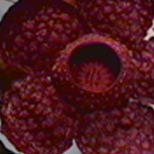

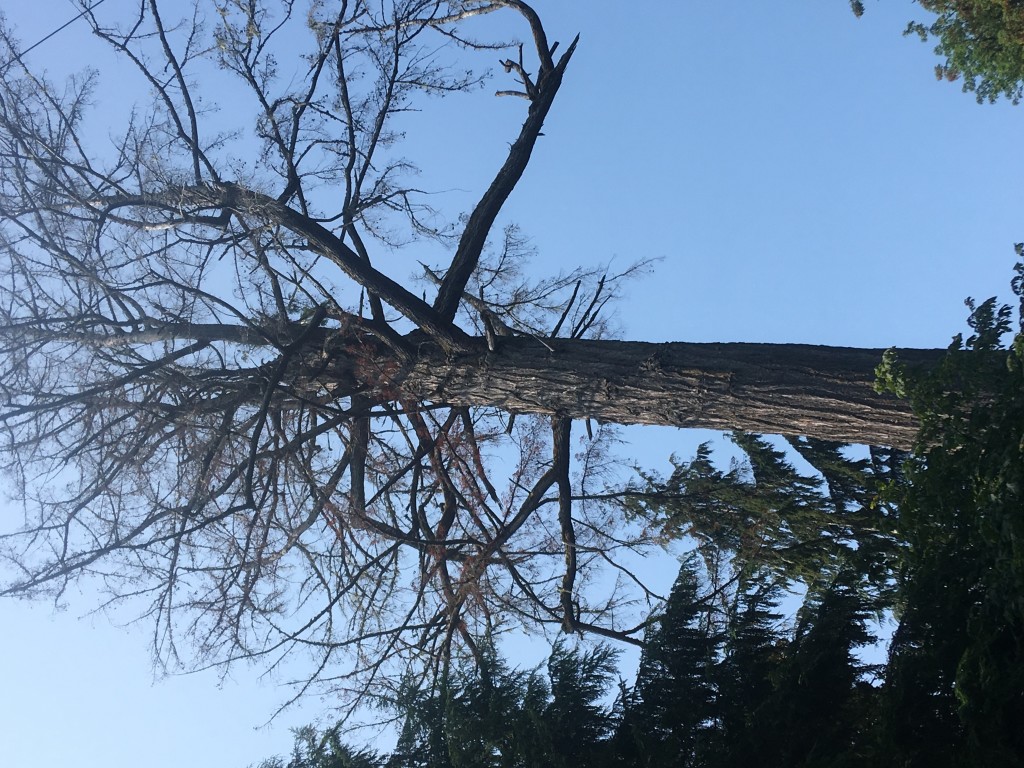
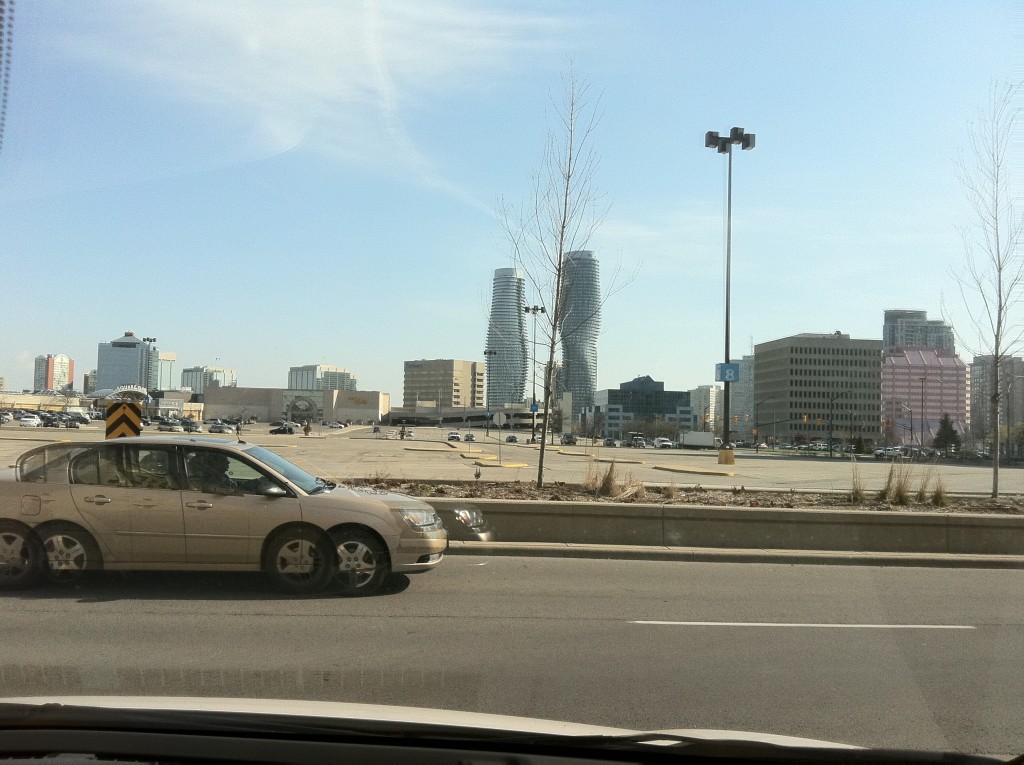
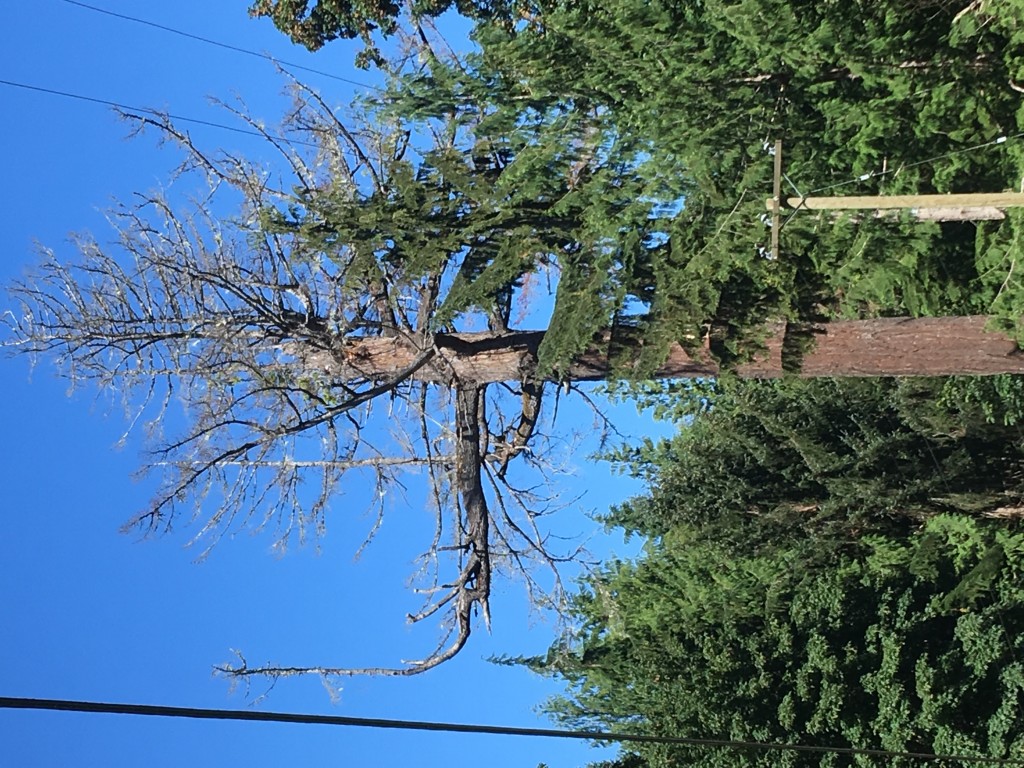
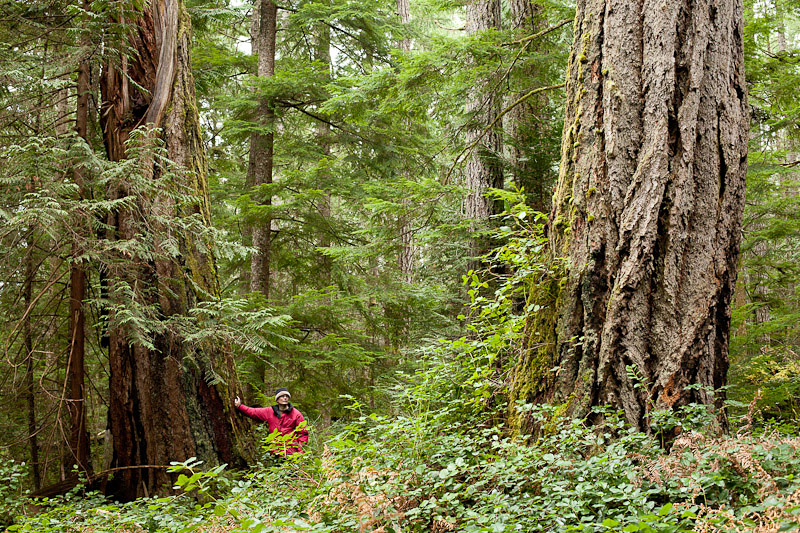
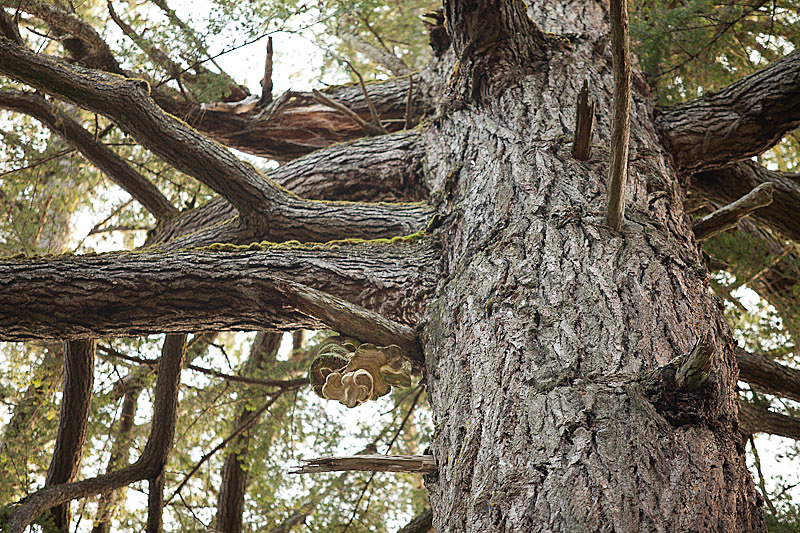
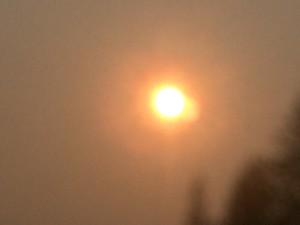
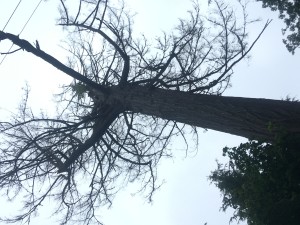


Thank you, Oliver, for this paean to our arboreal elders, to your parents and to our beloved planet. Your lyrical writing and sensitive perception move me profoundly. Grateful to you for continuing The Show So Far.